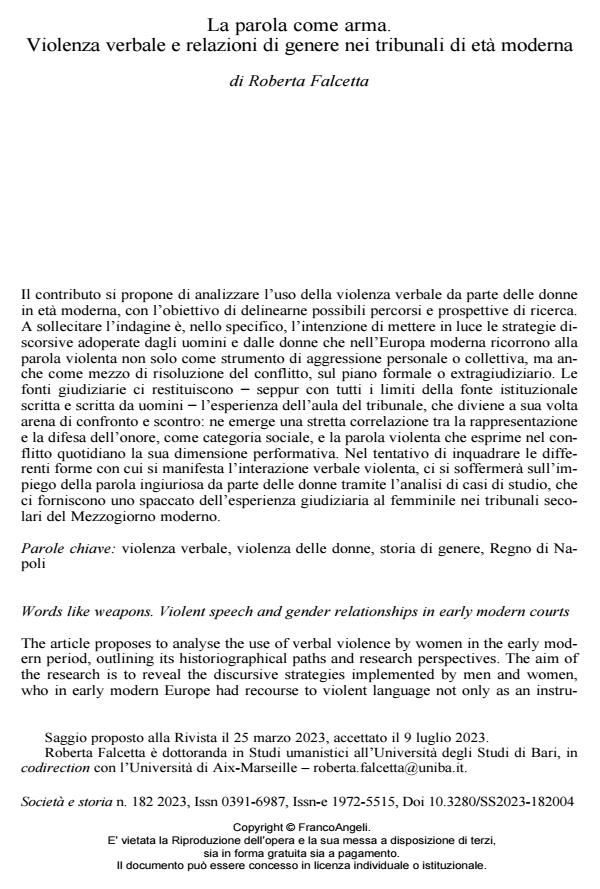La parola come arma. Violenza verbale e relazioni di genere nei tribunali di età moderna
Titolo Rivista SOCIETÀ E STORIA
Autori/Curatori Roberta Falcetta
Anno di pubblicazione 2023 Fascicolo 2023/182
Lingua Italiano Numero pagine 30 P. 745-774 Dimensione file 226 KB
DOI 10.3280/SS2023-182004
Il DOI è il codice a barre della proprietà intellettuale: per saperne di più
clicca qui
Qui sotto puoi vedere in anteprima la prima pagina di questo articolo.
Se questo articolo ti interessa, lo puoi acquistare (e scaricare in formato pdf) seguendo le facili indicazioni per acquistare il download credit. Acquista Download Credits per scaricare questo Articolo in formato PDF

FrancoAngeli è membro della Publishers International Linking Association, Inc (PILA)associazione indipendente e non profit per facilitare (attraverso i servizi tecnologici implementati da CrossRef.org) l’accesso degli studiosi ai contenuti digitali nelle pubblicazioni professionali e scientifiche
Il contributo si propone di analizzare l’uso della violenza verbale da parte delle donne in età moderna, con l’obiettivo di delinearne possibili percorsi e prospettive di ricerca. A sollecitare l’indagine è, nello specifico, l’intenzione di mettere in luce le strategie discorsive adoperate dagli uomini e dalle donne che nell’Europa moderna ricorrono alla parola violenta non solo come strumento di aggressione personale o collettiva, ma anche come mezzo di risoluzione del conflitto, sul piano formale o extragiudiziario. Le fonti giudiziarie ci restituiscono - seppur con tutti i limiti della fonte istituzionale scritta e scritta da uomini - l’esperienza dell’aula del tribunale, che diviene a sua volta arena di confronto e scontro: ne emerge una stretta correlazione tra la rappresentazione e la difesa dell’onore, come categoria sociale, e la parola violenta che esprime nel conflitto quotidiano la sua dimensione performativa. Nel tentativo di inquadrare le differenti forme con cui si manifesta l’interazione verbale violenta, ci si soffermerà sull’impiego della parola ingiuriosa da parte delle donne tramite l’analisi di casi di studio, che ci forniscono uno spaccato dell’esperienza giudiziaria al femminile nei tribunali secolari del Mezzogiorno moderno.
Parole chiave:violenza verbale, violenza delle donne, storia di genere, Regno di Napoli
Roberta Falcetta, La parola come arma. Violenza verbale e relazioni di genere nei tribunali di età moderna in "SOCIETÀ E STORIA " 182/2023, pp 745-774, DOI: 10.3280/SS2023-182004